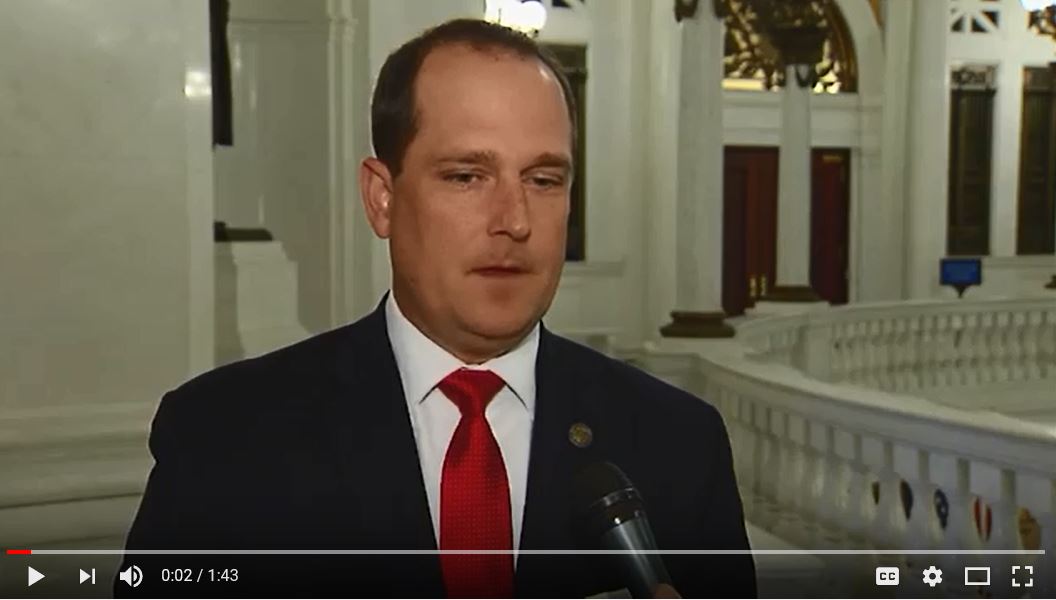 |
|
|
| [[Opt In Top]] |
| Monthly Roundup |
| #Listrak\DateStampLong# |
The latest news from the State Capitol |
Protecting Our Communities
|
New State Budget Invests in Community Protection
The new state budget, which took effect July 1, directs critical investments to support community protection efforts.
It includes funding to train three new state police cadet classes, which will add another 285 troopers to the statewide complement. In a win for rural areas, the budget also prevented a $25 per capita fee from being charged to local communities to pay for state police protection.
The budget also gives a boost to ambulance companies, which would see a needed increase in Medicaid reimbursement rates for an additional $4 million in state funds and nearly $8 million in federal matching funds, beginning Jan. 1.
Specifically, reimbursements for Advanced Life Support (ALS) services will be increased from $200 to not less than $300, and Basic Life Support (BLS) services will be increased from $120 to $180. Current rates are more than 200 percent below reimbursements provided by Medicare and commercial insurance. Reimbursements will also be raised for air ambulance services.
|
Rural Broadband Update
The lack of rural broadband access is a major problem in rural communities like ours, impacting our economy, educational opportunities, health care access and more.
While the General Assembly has been working on legislation to address the problem, one of the challenges we face is the lack of clear information about actual internet speeds in various areas of the Commonwealth.
The Center for Rural Pennsylvania and its research partners at Penn State University are inviting Pennsylvania residents to help provide that much-needed information by taking the broadband speed test available here. Your participation will help map broadband access in Pennsylvania, providing a valuable tool as lawmakers work to resolve this issue.
|
2018-19 Budget Recap
On June 22, Gov. Tom Wolf signed into law a no-tax-increase budget for the 2018-19 fiscal year. House Bill 2121 puts the taxpayers at ease knowing additional money will not come out of their paychecks or pockets, increases for vital services like: Education, EMS, and Community Hospitals are included, and for the first time in a decade money will be deposited in the state’s Rainy-Day Fund.
The $32.7 billion spending plan is a 1.7 percent increase over the current fiscal year budget, which is below the rate of inflation.
We were able to increase the funding for our local schools and universities here in the Commonwealth. These funding increases consist of creating a new, $60 million initiative to ensure Pennsylvania’s children are in a safe learning environment and investing $100 million more for basic education, $25 million more for early childhood education and an additional $15 million for special education. This equates to a record-high $12.3 billion for prekindergarten through 12th-grade education.”
Listed below is the funding each of the local school districts in my district will be receiving when the budget takes effect.
• Connellsville School District: $45,453,015
• Frazier School District: $9,886,433
• Laurel Highlands School District: $14,297,028
• Southmoreland School District: $14,837,599
The budget also includes a 3 percent increase for Pennsylvania’s state-related universities and community colleges; a 3.3 percent boost for the State System of Higher Education; and $30 million more for career and technical education.
Further funds will go toward helping protect communities by training more state police troopers, caring for those with intellectual disabilities, supplying home visiting services for families affected by opioid crisis and supporting emergency medical services.
This budget is the result of prudent spending, an improved economy and responsible policies that prevented the need for the governor’s repeated calls for increased taxes over the last four years.
More information is available here.
|
CodeRed Emergency System for Fayette County
Back in April, Fayette County adopted the CodeRed emergency system, which would alert residents, via telephone, text message and email, of impending emergencies, missing persons, community alerts, etc.
Fayette County Emergency Management Agency will also be providing public safety alerts through the CodeRed Mobile Alert app. This app can be downloaded for free from the App Store and Google Play where it will have the ability to push notifications to your phone when the county sends out an alert.
The app will be used in conjunction with the CodeRed emergency system to keep the public informed, even when they are on the go.
If you would like to sign up for the CodeRed notifications, click here.
|
New Law to Maximize Law Enforcement Resources
A new law taking effect early this fall will help enhance the safety of police officers and the public.
Act 57 of 2018 (formerly House Bill 1738) expands the types of officers who can act outside their jurisdictional boundaries in certain urgent situations. This will help facilitate more cooperation among different types of police departments and agencies, ultimately improving public safety for everyone.
Under previous law, municipal police officers have been authorized to act beyond their jurisdictional boundaries under the following conditions: where an officer is in hot pursuit of a traffic violator or criminal suspect, when requested to lend assistance to another department, when executing a court order or if an officer witnesses a crime being committed while in another jurisdiction on official business. However, the law only applies to those police officers employed by a municipality.
As part of the new law, the types of officers authorized to operate outside their jurisdiction would be expanded to include non-municipal officers who must receive training and be certified under Act 120, the Municipal Police Officers Education and Training Act. This may include officers serving with airport authority, college and university or certain other police departments, as well as agents in the Office of Attorney General.
|
Raising Awareness of ChildLine Reporting System
All schools in the Commonwealth will be required to publicly display a poster containing the statewide toll-free number for reporting suspected child abuse, beginning in the 2018-19 school year. Known as ChildLine, Pennsylvania’s statewide toll-free hotline number to report suspected child abuse is 1-800-932-0313.
Posting this critical information in schools will let students know they have somewhere to turn if they need to report abuse or neglect that they’ve suffered or if they suspect another child is being abused or neglected.
The poster is required to be displayed in a high-traffic, public area widely used by students. The poster also would include the address of the Department of Human Services’ website that provides information and resources related to child protection.
|
Sex Offenders Now Prohibited from ARD
Individuals charged with sex offenses against children will be prohibited from being placed into the state’s Accelerated Rehabilitative Disposition program (ARD) under a new law signed last week.
The ARD program is designed to give a first-time offender a second chance by avoiding the consequences of being convicted of a crime. Under the ARD program, if a defendant successfully completes a period of supervision and follows the requirements imposed by the court, the case is dismissed.
Though most Pennsylvania prosecutors judiciously reserve ARD for those who are truly deserving, the Pennsylvania Rules of Criminal Procedure currently have allowed prosecutors complete discretion to recommend any defendant for placement into the program regardless of the crime.
Act 50 of 2018, formerly House Bill 594, will help ensure that predators who sexually assault children will never avoid prosecution.
|
|
| Office Locations |
| Capitol Office: Room B-11, Main Capitol Building, PO Box 202052, Harrisburg PA 17120-2052 | (717) 787-1540 |
| District Office: 1040 Eberly Way, Suite 250, Lemont Furnace, PA 15456 I Phone: (724) 437-1105 |
| Email: rwarner@pahousegop.com |
|
|










